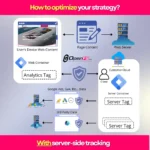What is AI and How Does it Drive Digital Marketing?
In today’s rapidly evolving digital landscape, artificial intelligence (AI) has emerged as a transformative force in marketing. But what exactly is AI and how is it revolutionizing the way businesses connect with customers? Let’s explore this fascinating technology and its profound impact on digital marketing strategies.
Demystifying AI: Understanding the Technology Behind Digital Marketing
At its core, AI is like an incredibly intelligent learning system that continuously improves through experience. Think of it as teaching a child to recognize animals – you show pictures of cats, label them as “cats,” and eventually, they can identify cats on their own. Similarly, AI systems process vast amounts of marketing data, identifying patterns and making connections that might be invisible to human marketers.
In digital marketing, this translates to AI analyzing customer behaviors, browsing patterns, and purchase histories to deliver more targeted, personalized experiences. Rather than just a buzzword, AI has become an essential marketing tool because it can process enormous volumes of data at unprecedented speeds, uncovering actionable insights that would take humans years to discover manually.
How AI Transforms Modern Digital Marketing Strategies
The integration of AI into digital marketing isn’t just changing how we work—it’s completely reshaping what’s possible. From automated customer interactions to predictive analytics, AI is revolutionizing every aspect of the marketing landscape.
AI-Powered Chatbots: Revolutionizing Customer Engagement
One of the most visible applications of AI in digital marketing is the widespread adoption of intelligent chatbots. These AI assistants provide 24/7 customer support, answering product questions, processing orders, and resolving issues without human intervention. Imagine browsing an e-commerce store at midnight and getting immediate answers about product specifications or shipping options—that’s the power of AI chatbots in action.
This round-the-clock availability significantly enhances customer experience while reducing operational costs. According to research, businesses implementing AI chatbots have seen up to 30% reductions in customer service costs while improving satisfaction rates. For more insights on how this technology fits into broader digital strategies, check out our guide on digital marketing services for small businesses.
Personalization at Scale: Tailoring Customer Experiences
Remember when Netflix seems to know exactly what show you’ll want to watch next? That’s AI-driven personalization at work. By analyzing your viewing history and comparing it with millions of other users, AI algorithms can predict your preferences with remarkable accuracy.
In digital marketing, this same technology enables businesses to create highly personalized experiences across all touchpoints. From customized email campaigns to dynamic website content that changes based on visitor behavior, AI makes one-to-one marketing possible at scale. This personalization isn’t just convenient—it drives results. Personalized email marketing, for instance, delivers 6x higher transaction rates compared to generic messaging.
The AI Process in Digital Marketing: Understanding the Mechanics
To truly grasp how AI drives digital marketing success, it’s helpful to break down the process into its fundamental components. This step-by-step approach shows exactly how AI transforms raw data into marketing gold.
Data Collection: The Foundation of AI Marketing
Every successful AI marketing implementation begins with comprehensive data collection. This includes:
- Customer demographics and purchase histories
- Website interactions (pages visited, time on page, click patterns)
- Social media engagement metrics
- Email campaign performance data
- Search behavior and preferences
The quality and breadth of this data directly impact the effectiveness of AI marketing solutions. That’s why businesses focusing on conversion rate optimization place such emphasis on proper data collection infrastructures.
Intelligent Processing: Turning Data Into Insights
Once collected, AI systems process this information using sophisticated algorithms and machine learning models. During this crucial phase, the AI identifies patterns like:
- Correlations between specific product views and subsequent purchases
- Optimal timing for marketing communications
- Content preferences across different customer segments
- Factors that influence conversion rates
These insights form the foundation for more targeted, effective marketing initiatives. For example, our team at Digital Marketing New Jersey uses AI-powered analytics to uncover content optimization opportunities that might otherwise remain hidden.
Predictive Marketing: Anticipating Customer Needs
Perhaps the most powerful aspect of AI in digital marketing is its predictive capability. By analyzing historical data, AI can forecast future customer behaviors with remarkable accuracy. For instance, if a customer frequently browses running shoes but hasn’t made a purchase, AI might predict they’re comparison shopping and trigger a timely discount offer.
This predictive power enables marketers to be proactive rather than reactive, addressing customer needs before they’re even explicitly expressed. It’s transforming how businesses approach everything from inventory management to content creation, enabling truly anticipatory marketing.
AI-Driven Marketing Strategies That Deliver Results
Understanding how AI works is one thing—implementing it effectively is another. Let’s explore some proven AI marketing strategies that are delivering exceptional results for businesses across industries.
Hyper-Personalization: Creating Individual Customer Journeys
Today’s consumers expect personalized experiences, and AI makes this possible at unprecedented scale. Using advanced segmentation and real-time data analysis, AI can create truly individualized marketing journeys:
- Emails with product recommendations based on browsing history
- Website content that dynamically adjusts to visitor interests
- Social media ads that reflect recent brand interactions
- Push notifications triggered by location or behavior patterns
This level of personalization was simply impossible before AI. The results speak for themselves: businesses implementing AI-driven personalization report revenue increases of 10-30%. For more on implementing these strategies, explore our guide on mastering digital marketing trends and metrics.
Content Optimization: Creating More Effective Marketing Assets
AI isn’t just changing content distribution—it’s revolutionizing content creation itself. AI-powered tools can now analyze which content elements perform best with different audience segments, identifying:
- High-performing keywords and topic clusters
- Optimal content formats and lengths
- Most engaging visual elements
- Ideal publishing schedules
For businesses focused on search engine optimization, these insights are invaluable. They enable the creation of content that not only ranks well but genuinely resonates with target audiences, driving both traffic and conversions.
Predictive Analytics: Staying Ahead of Market Trends
In today’s fast-moving market, being reactive isn’t enough—businesses need to anticipate changes before they happen. AI-powered predictive analytics make this possible by forecasting:
- Emerging product demand trends
- Shifts in customer search behavior
- Optimal timing for marketing campaigns
- Competitive threats and opportunities
This foresight enables businesses to position themselves advantageously, developing products and marketing campaigns that meet emerging needs before competitors can respond. For businesses in competitive markets like New Jersey, this capability can be a significant differentiator, as outlined in our analysis of generative AI in digital marketing.
Implementing AI in Your Digital Marketing Strategy
Ready to harness the power of AI in your marketing efforts? Here’s a practical roadmap for getting started, regardless of your organization’s size or current technical capabilities:
- Identify specific goals and challenges where AI could make the biggest impact—whether that’s improving lead quality, reducing customer acquisition costs, or enhancing retention.
- Audit your current data collection practices to ensure you’re gathering the quality information AI systems need to generate valuable insights.
- Start with proven, accessible AI tools that integrate with your existing marketing stack—many email platforms, CRMs, and analytics solutions now offer AI capabilities.
- Educate your marketing team about AI capabilities and limitations to ensure they can effectively leverage these new tools.
- Implement a test-and-learn approach, starting with smaller AI initiatives before scaling successful approaches.
Remember, effective AI implementation isn’t about replacing human marketers—it’s about augmenting their capabilities. The most successful AI marketing strategies combine technological power with human creativity and strategic thinking. For a deeper dive into implementation, explore our guide on enhancing search visibility with AI.
The Future of AI in Digital Marketing
As we look ahead, it’s clear that AI will continue to transform digital marketing in profound ways. Some emerging trends to watch include:
- Voice and visual search optimization as AI-powered search evolves beyond text
- Immersive AR/VR experiences enhanced by AI-driven personalization
- Predictive customer service that resolves issues before they’re reported
- Advanced emotion recognition enabling more empathetic marketing communications
Businesses that embrace these trends will gain significant advantages in increasingly competitive digital marketplaces. To stay ahead of these developments, consider exploring web design and development solutions that can accommodate these emerging AI capabilities.
By understanding what AI is and how it drives digital marketing, you’re positioning your business to thrive in an increasingly AI-powered world. The question isn’t whether to adopt AI marketing—it’s how quickly and effectively you can implement it to gain competitive advantage.
Frequently Asked Questions
What are the main benefits of using AI in digital marketing?
AI delivers numerous marketing advantages including hyper-personalization at scale, predictive customer insights, automated campaign optimization, more efficient ad spending, 24/7 customer engagement through chatbots, and the ability to process and analyze massive datasets that would be impossible for humans to handle manually.
Is AI in digital marketing only accessible to large enterprises?
Absolutely not. Today’s AI marketing solutions range from enterprise-level platforms to affordable tools specifically designed for small and medium businesses. Many popular marketing platforms now include AI features in their standard offerings, making this technology accessible regardless of company size or budget.
How does AI improve conversion rates in digital marketing?
AI boosts conversions by delivering more relevant content to prospects, optimizing messaging based on individual preferences, identifying the perfect timing for marketing communications, personalizing product recommendations, and continuously testing and refining landing pages and calls-to-action to maximize performance.
What skills do marketers need to work effectively with AI tools?
While specialized technical knowledge isn’t necessary for most marketing AI applications, successful implementation requires data literacy, analytical thinking, an experimental mindset, ethical awareness around data usage, and the ability to translate AI insights into strategic marketing decisions. Most importantly, marketers need adaptability as AI tools continue to evolve rapidly.
 Written by: Romulo Vargas Betancourt
Written by: Romulo Vargas Betancourt
CEO – OpenFS LLC







